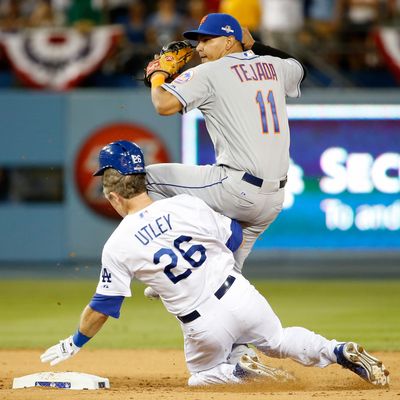
The Mets took a 2-1 lead into the bottom of the seventh inning of Game 2 of the NLDS Saturday night, using pretty much the same formula they had in their win the night before. Noah Syndergaard was pitching splendidly, and the Mets’ bats had done just enough against Zack Greinke, the Dodgers’ other ace. But Syndergaard got into trouble in the seventh and left the game with one out and and runners on first and third. It was at this point that things got weird.
Here’s the controversial sequence of events that turned Game 2:
• Bartolo Colon entered the game in relief of Syndergaard, and on his fifth pitch, Howie Kendrick hit a ground ball up the middle, which was fielded by second baseman Daniel Murphy, who flipped it to shortstop Ruben Tejada. Tejada caught the throw toward the back of second base, appeared to step on the bag, and then turned to try to make a throw to first for the double play.
• But before he could throw, Chase Utley knocked him down with a vicious slide (if you can even call what he did a slide), and the runner from third scored. Utley, who never touched the base, was ruled out, and returned to the Dodgers’ dugout. Here’s the play:
• With Tejada still down on the ground, the play was reviewed, and replays showed that Tejada’s foot just missed touching the bag. In baseball, the so-called “neighborhood play” is generally accepted, which allows an infielder attempting to turn a double play to step close to the bag, as opposed to stepping directly on it, if a runner is coming at him. In fact, the neighborhood play isn’t even reviewable. But the umpires ruled that the throw took Tejada off the bag, and if it’s determined that an infielder couldn’t actually turn two on such a play, the neighborhoood play isn’t an option, and it’s treated like any other force play. That part of things isn’t so unreasonable; Tejada didn’t have much chance of actually getting Kendrick at first, and he didn’t appear to actually make contact with the bag. Of course, none of this would seem to matter, because Utley never actually touched the base.
• Tejada’s leg was placed in an air cast, and he was taken off the field on a cart.
• Upon review, Utley was ruled safe, and sent back to second base. The explanation given to the TBS booth was that if an ump misses a play, he can correct it and put the runner back on the bases even if he didn’t touch the bag. That explanation didn’t really answer the obvious question, though: How could he be safe if he never touched the base, even if Tejada didn’t actually force him out?
• Because of that, the Mets apparently could neither challenge the new ruling, nor appeal the play once the game started back up.
• The game resumed with the score tied at two, with runners on first and second, and one out instead of two. Addison Reed relieved Colon, and got a fly ball for the second out, which would have been the third if Utley wasn’t ruled safe.
• The next batter, Adrian Gonzalez, doubled to right, scoring two more runs and giving the Dodgers a 4-2 lead.
• The next batter, Justin Turner, also doubled, scoring Gonzalez to make the score 5-2.
The Mets couldn’t push across any runs in the eighth or ninth, and the Dodgers held on to win the controversial game 5-2 to even up the series. And to add injury to insult, word came down later in the game that Tejada has a fractured right fibula.
After the game, MLB chief baseball officer Joe Torre said that “I don’t feel [Utley] was trying to hurt somebody….He was within range of the bag.” He added, though, that “The lateness of the slide concerns me. We’re still basically talking about it. The umpire (gets) one shot. I can’t fault him.” Torre also said that he’d review the Utley slide again to determine if any discipline was necessary. But it’s the league’s historically lax attitude toward such plays that hardly discourages slides like that in the first place.
Torre also offered an explanation of why the call was overturned. Via ESPN: “Tejada showed that he didn’t touch the bag, and Utley never touched second base. The fact that he was called out meant he didn’t – he’s not required to touch second base once he’s called out. So when the play was overturned, he gets awarded second base on that.” In other words, since he was incorrectly called out (when in reality he was neither safe nor out initially), he gets to stay at second. Had a Met tagged him as he walked off the field, then he would have been out, even after a replay. Though as David Wright said after the game: “Once obviously the player is called out, you don’t go tag him, especially when you’re lying there with a broken leg.”
The series takes a day off Sunday before resuming on Monday night in Queens, with Matt Harvey taking the mound for the Mets. (If Utley plays in Game 3, all eyes will be on whether the Mets retaliate, though that would require a certain set of circumstances in such an important game.) Speaking of Game 3: Traditionally, the entire rosters of both teams are introduced to the crowd before the first game at each ballpark in a playoff series. Utley, a longtime member of the Phillies, would have been booed anyway when his name was announced. But now that he’s become Public Enemy No. 1 in this series, if he’s not suspended, his Citi Field greeting will surely be even harsher.
This post has been updated with additional information.





























